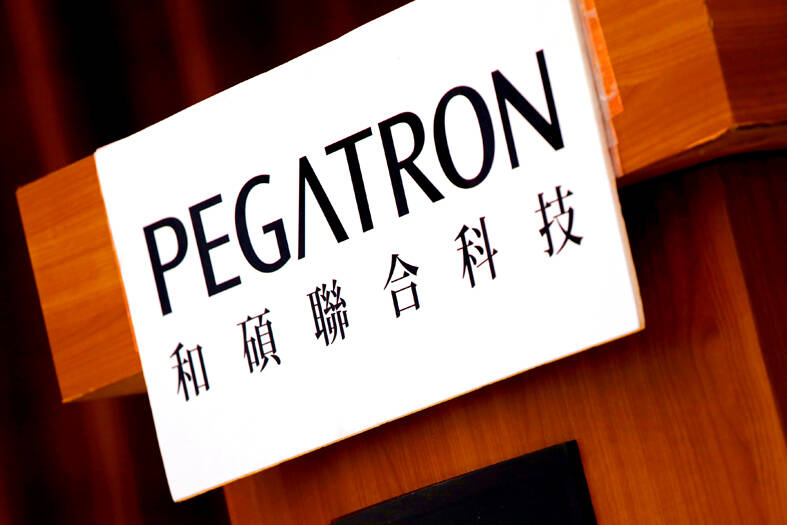Pegatron Corp (和碩), one of Apple Inc’s iPhone assemblers, yesterday said it is forfeiting control of a once fully owned subsidiary to Chinese rival Luxshare Precision Industry Co (立訊精密) in its latest effort to diversify its manufacturing sites geographically.
Its indirect share of Pegaglobe (Kunshan) Co Ltd (世碩電子) would drop to about 37.5 percent following the Chinese subsidiary’s latest share offerings, Pegatron said in a filing with the Taiwan Stock Exchange.
Luxsan Precision iTech (Kunshan) Co Ltd (立臻精密), a subsidiary of Luxshare, would subscribe to all of the new shares issued by Pegaglobe, which are worth 2.11 billion yuan (US$298.86 million), the filing said.

Pegaglobe has increased its registered shares to optimize its business as it braces for a rapidly changing industry environment and market conditions by forming a strategic partnership with Luxsan, Pegatron said in an e-mailed note.
The partnership would help Pegatron better utilize its resources and balance its global deployment, it said.
As Pagaglobe’s business model would remain intact, the deal would have limited impact on its operations, Pegatron said.
The firm said that it is diversifying its capacity geographically to provide as many options as possible for customers.
China remains its major manufacturing hub, with non-China capacity accounting for 15 percent, it said.
For Luxsan Precision iTech, the deal matches its strategy of boosting its smartphone assembling capacity to seek a bigger share of Apple Inc orders.
The Kunshan-based company in 2020 acquired two Wistron Corp (緯創) factories in China’s Jiangsu Province.
Wistron, which used to compete with Pegatron and Hon Hai Precision Industry Co (鴻海精密) for iPhone manufacturing orders, has disposed of its Chinese and Indian iPhone manufacturing capacity to focus on better-margin products such as artificial intelligence servers.
While Pegatron’s Chinese presence is shrinking, the company is expanding its manufacturing footprint in Vietnam.
In a separate filing yesterday, Pegatron said it plans to spend about NT$1.19 billion (US$38.74 million) to build new manufacturing facilities in Vietnam through its Pegatron Vietnam Co Ltd subsidiary.
Additionally, the firm would spend about NT$825 million to build employee dormitories in Vietnam, a separate filing said.
In Vietnam, Pegatron primarily makes consumer electronics such as smart speakers for Google, Surface laptops for Microsoft Corp and gaming consoles.
In Mexico, Pegatron makes electronic control units for vehicles, charging piles and components used in charging devices for a North American-based customer reported to be Tesla Inc.
The company also operates factories in India, Indonesia and the Czech Republic, it said.
Pegatron plans to spend US$300 million to US$350 million on new equipment and facilities this year.

Nvidia Corp’s demand for advanced packaging from Taiwan Semiconductor Manufacturing Co (TSMC, 台積電) remains strong though the kind of technology it needs is changing, Nvidia CEO Jensen Huang (黃仁勳) said yesterday, after he was asked whether the company was cutting orders. Nvidia’s most advanced artificial intelligence (AI) chip, Blackwell, consists of multiple chips glued together using a complex chip-on-wafer-on-substrate (CoWoS) advanced packaging technology offered by TSMC, Nvidia’s main contract chipmaker. “As we move into Blackwell, we will use largely CoWoS-L. Of course, we’re still manufacturing Hopper, and Hopper will use CowoS-S. We will also transition the CoWoS-S capacity to CoWos-L,” Huang said

Nvidia Corp CEO Jensen Huang (黃仁勳) is expected to miss the inauguration of US president-elect Donald Trump on Monday, bucking a trend among high-profile US technology leaders. Huang is visiting East Asia this week, as he typically does around the time of the Lunar New Year, a person familiar with the situation said. He has never previously attended a US presidential inauguration, said the person, who asked not to be identified, because the plans have not been announced. That makes Nvidia an exception among the most valuable technology companies, most of which are sending cofounders or CEOs to the event. That includes

TARIFF TRADE-OFF: Machinery exports to China dropped after Beijing ended its tariff reductions in June, while potential new tariffs fueled ‘front-loaded’ orders to the US The nation’s machinery exports to the US amounted to US$7.19 billion last year, surpassing the US$6.86 billion to China to become the largest export destination for the local machinery industry, the Taiwan Association of Machinery Industry (TAMI, 台灣機械公會) said in a report on Jan. 10. It came as some manufacturers brought forward or “front-loaded” US-bound shipments as required by customers ahead of potential tariffs imposed by the new US administration, the association said. During his campaign, US president-elect Donald Trump threatened tariffs of as high as 60 percent on Chinese goods and 10 percent to 20 percent on imports from other countries.

INDUSTRY LEADER: TSMC aims to continue outperforming the industry’s growth and makes 2025 another strong growth year, chairman and CEO C.C. Wei says Taiwan Semiconductor Manufacturing Co (TSMC, 台積電), a major chip supplier to Nvidia Corp and Apple Inc, yesterday said it aims to grow revenue by about 25 percent this year, driven by robust demand for artificial intelligence (AI) chips. That means TSMC would continue to outpace the foundry industry’s 10 percent annual growth this year based on the chipmaker’s estimate. The chipmaker expects revenue from AI-related chips to double this year, extending a three-fold increase last year. The growth would quicken over the next five years at a compound annual growth rate of 45 percent, fueled by strong demand for the high-performance computing